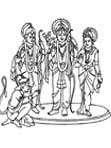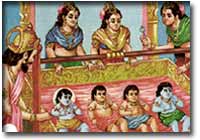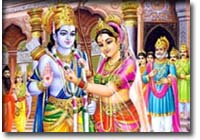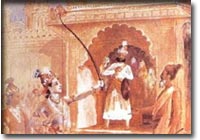Balakandam
Introduction
 |

At the same time a parallel happening was taking place in the heaven. The celestials approached Brahma, the creator and complained to him about the atrocities perpetrated by Ravana, the demon of Lanka. Now Brahma and the retinue presented this problem to Mahavishnu. With a smile the Lord said he would forthwith incarnate as man, the son of Dasaratha and set right the evil. On earth, the performance of yajna by Dasaratha was at its zenith. A resplendent deity emerged from within the sacred sacrificial fire. Solemnly he offered to Dasaratha a gold vessel containing milk pudding. The deity instructed the king to distribute that ambrosia among his three queens for progeny. Dasaratha distributed a half of the celestial food to Kausalya, the first queen, a quarter to Sumitra and the remaining quarter to Kaikeyi. The wheel of time rolled on and Rama was born of Kausalya. Subsequently Kaikeyi gave birth to Bharatha. Then Sumithra begot the twins, Lakshmana and Satrughna. The four brothers were the embodiments of righteousness, truth, fidelity and heroism.
The four brothers loved one another dearly. The brothers were the delight of the parents as well as the people. Rama in particular was to one and all the source of joy and the pole star of the future. King Dasaratha thought that the time had come for the betrothal of the sons. King Dasaratha and his ministers were absorbed in the discharge of the public duty. A warder steps in and announces the arrival of the great Rishi Vishwamithra. Dasaratha offers devotional welcome to the holy guest and touches his feet as a mark of reverence. Dasaratha said, "Blessed am I, blessed is my family and my lineage that you have deigned to sanctify my abode by setting foot on it. Your arrival here is equal to several sacred place getting concentrated here. I dedicate my all to you. I offer to carry out your command reverentially."
The sage was pleased with the royal bounty. With a smile he speaks, "May you be as firm in execution as you are liberal in speech. I am celebrating a sacrifice. Two demons named Maricha and Subahu are bent upon defiling it with blood and flesh. On larger interest I should not direct my psychic power acquired by austerity against them. Your eldest son Rama is the one person who can do away with those demons, I want the service of your son just for ten days. The time has come for him to display the divine valour on public interest. Vasistha and other assembled sages here will endorse my view." So Dasaratha submitted to Viswamithra that he would surrender Rama and his counterpart Lakshmana for the contemplated holy task. Receiving the blessings of the parents and the elders Rama and Lakshmana set out with the sage. The great rishi and his royal pupils spent the first night of their journey on the bank of the river Sarayu. Two mystic formulae known as Bala and Atibala were then taught to the pupils. Strength and great strength are the meanings of those psychic forces, by the use of which man can withstand fatigue, hunger and thirst.

One fine morning Viswamithra communicated to Rama a great event that was to take place at Mithila, the capital of the Sage King Janaka. There was a wonderful bow exhibited in that city. Many talented people from far and near would gather there. Several inmates of the Siddhasrama were getting ready to accompany the presiding sage to that city of culture. The pupils submitted to the will of the preceptor. The party set out on journey and proceeded.
Viswamithra's group quietly entered the extensive compound and got up for the sacrificial rites at Mithila. The king was delighted to hear of the arrival of the spiritual giant Viswamithra at his sacrificial theatre. He presented himself before the sage and expressed his gratitude for the former's reigning to sanctify the sacrifice with his holy presence. Presently the King's attention was inquisitively drawn towards the heavenly handsome lads found among the hermitage. The different phases of the sacrifices started and finally the last phase of horse sacrifice was the selection of a suitable groom to Sita of heavenly beauty whom the King Janaka had obtained as a boon from the mother earth. Exceedingly trying was the test of the worth of the prince who would sue for the charming Sita's hand in betrothal. Whoever lifted, bent and strung that unwieldy bow became the partner of that priceless princess of Mithila. Many a prince dare not try the test which was humanly impossible. Now at the request of sage Viswamithra, the great and the godly bow was dragged on a suitable chariot to the assembly. The huge crowd gazed at the stupendous bow with amazement. The royal suitors in particular were dazed at the impossible test. The sage expectantly looked at Rama. The obedient pupil bowed to the master and gracefully walked towards the bow of Siva. There was a hushed silence among the audience. With ease the divine youth took up the bow.


